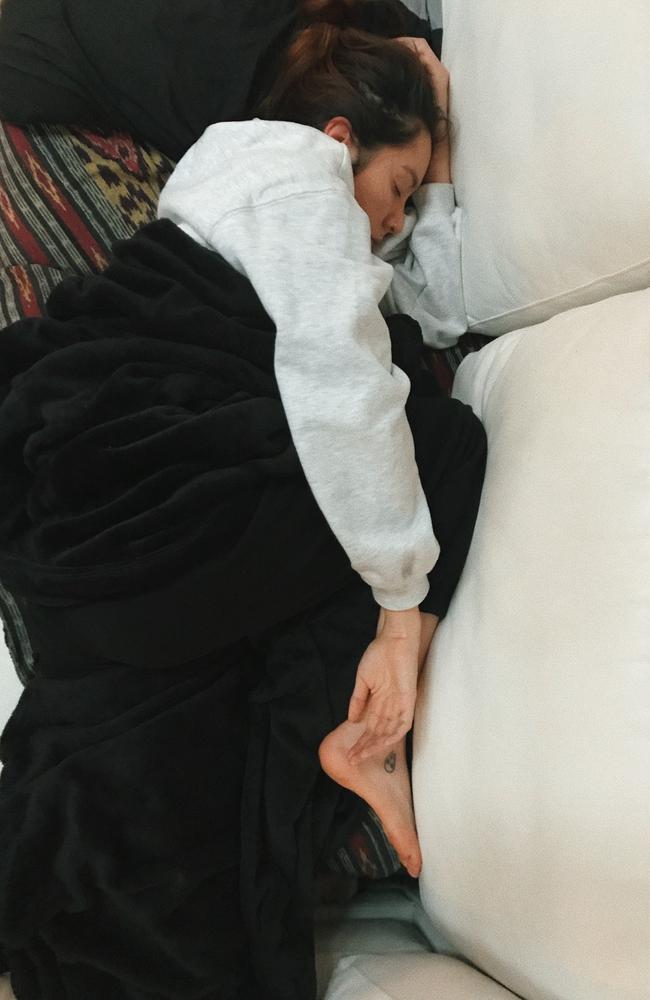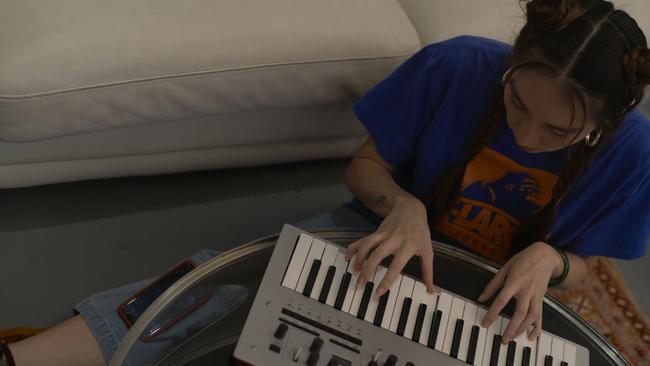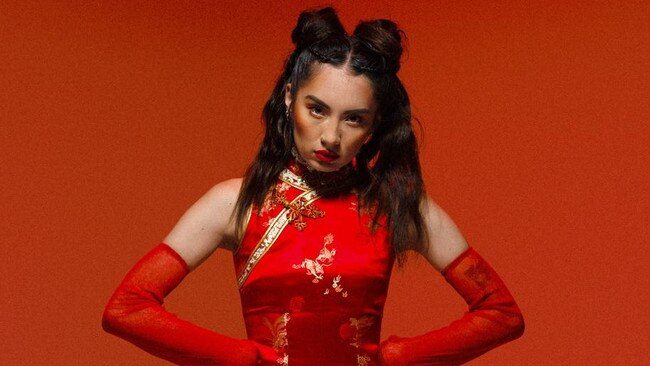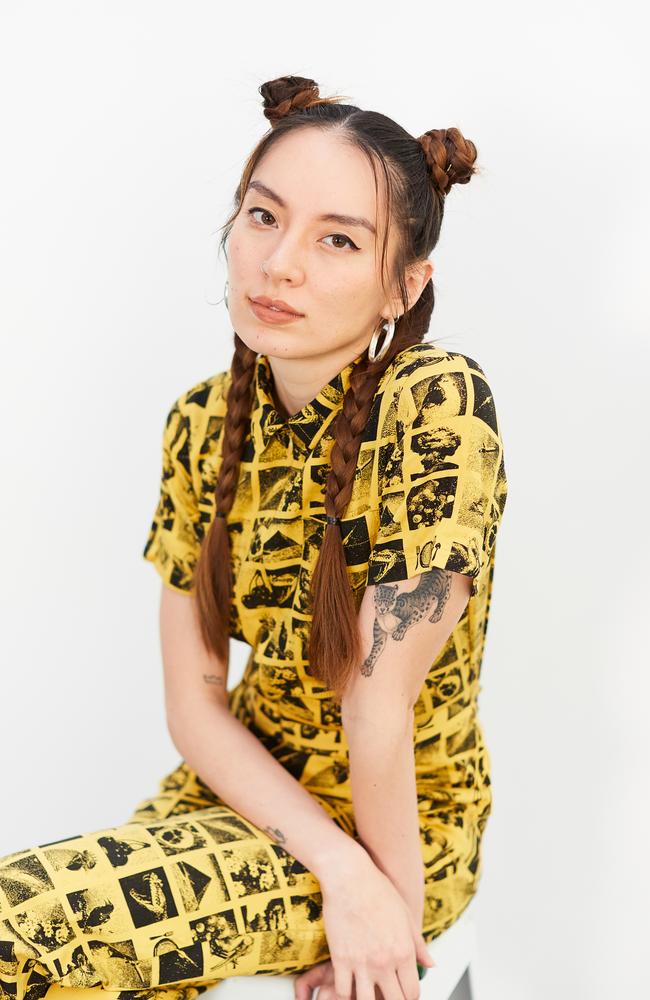‘It sucked my soul out’: Jaguar Jonze’s 40-day COVID-19 battle
Brisbane musician Jaguar Jonze reveals she could barely walk and struggled to breathe as she opens up on her horror 40-day battle with COVID-19. READ HER STORY.
U on Sunday
Don't miss out on the headlines from U on Sunday. Followed categories will be added to My News.
THIS is Deena Lynch’s new normal.
Finding animal shapes in the timber swirls of the walls like they’re clouds in the sky.
Intently watching a small vine near the ceiling grow over time from one leaf to 50cm long.
Gazing out the window for a reminder of outside life, hoping someone, anyone, will walk by.
The 28-year-old Brisbane musician is trapped in isolation, trying to find distractions so her mind doesn’t settle on the thought that terrifies her the most: what is going to happen to her?
On March 24, Lynch, who is better known as Jaguar Jonze, tested positive for COVID-19.
Eurovision: Australia Decides contestant Jaguar Jonze shares her life in COVID-19 ‘virtual hospital’
Southside singers Emma Bosworth, Jaguar Jonze nominated for QMAs
Brisbane singer Jaguar Jonze tests positive for coronavirus
Brisbane singer cuts tour short, tests positive for coronavirus
What she thought was jet lag after a long-haul flight to Australia from the US became the frightening and potentially fatal coronavirus – the condition behind the worst pandemic in recent history and the biggest global event since World War II.
She’s never experienced anything like it: unable to walk, fevers lasting weeks, throbbing chest pain, trouble breathing, crippling fatigue and weakening strength. On top of this, her mind is overloaded with anxiety from the uncertainty of it all.

For six weeks, she couldn’t go outside (other than to go to hospital) or physically see her family and friends.
Her livelihood, independence and health were stolen by this cruel, unforgiving virus that’s killing people around the world – and near her in hospital – at a relentless pace.
It’s unlike anything any of us have ever seen before.
And here Lynch is living in the middle of the nightmare that feels like it will never end.
But minutes before Lynch spoke to U on Sunday via video link from Sydney, where she’s been in isolation, she got a call with the news she’s been waiting more than a month to hear.
She’s finally in the clear, 40 days after she arrived back in Australia on March 19. Most of those days were spent in isolation, in what has been an unusually lengthy COVID-19 case.
A wide smile erupts on her face at the thought of enjoying simple things she’s missed after being locked inside for almost two months.
“I won’t take for granted going outside ever again,” she beams through the video from her boyfriend’s warehouse studio in Sydney.
“I just want a bit of freedom.”
It’s something she never thought she’d say and this is a story she never thought she’d tell.
Lynch, who was born in Yokohama in Japan, had arrived in the US wide-eyed and excited on her first tour.
She’d played three of her 14 shows and was looking forward to performing at South by Southwest, a major festival in Texas.
It was a trip full of opportunities for writing collaborations, management meetings and the chance to pave the way for a career in America.
But as news of the coronavirus began to unfold, it was obvious life was drastically changing. She needed to get home.

She changed her flight to arrive in Sydney, instead of Brisbane, where she normally lives with her mum in Eight Mile Plains. She didn’t want to put her mum’s health at risk, deciding to stay with her partner in Sydney with the studio space equipped with separate living quarters.
As soon as she landed, things began unravelling. Fast.
“In a matter of hours, I was bedridden and sick,” Lynch says.
“I thought maybe it was from travel because it’s not uncommon for me to get sick, but it derailed quite quickly.”
And then her condition worsened. The next day she took herself to get tested for COVID-19, where they took a swab from inside her nose and in the back of her throat. Four days later, on March 24, she tested positive.
Lynch had been in New York, which has become the global epicentre of the virus, with the most cases worldwide.
Her bandmates, who she’d been travelling with, had come home on a different flight, and they all tested negative, making her think she caught it on her flight home. It was relentless in its force and unforgiving in its power.
“There were moments when I had to break down and cry, I knew I was in a better situation than most but (it was hard) accepting the feelings of being sick for so long and feeling pathetic because I wasn’t able to do things for myself,” she says.
“Normally when I’m sick, I still like to do things like reading or drawing but I couldn’t do anything.
“It sucked my soul out.”
With more than three million confirmed COVID-19 cases across the world and the number of deaths rapidly rising, Lynch had no idea what was coming for her.
“I had gotten it so early that I was unsure of how it would hit at the time, no one really knew,” she says.
“At the start, you could’ve fooled me, I would’ve thought it was the typical dry air from the plane causing some sickness.”
But it was far from it. Lynch describes a living hell and a lonely battle.

“The first week I planted an inflatable mattress right here in the living room so I could be near the bathroom,” she says pointing to the patch of ground behind her.
“I couldn’t stand for more than 10 minutes, I was nauseous, fatigued, lethargic, had fevers for over a week and they kept fluctuating, my last fever was maybe five days ago.
“The coughing and excruciating chest pains meant I couldn’t even sleep sometimes … it was this radiating pain that was constant and that made me really worried.”
Lynch became a virtual patient with Royal Prince Alfred Hospital in Sydney, allowing her to recover at home but be closely watched by doctors.
She wore a patch on the side of her body which logged her temperature and was given mobile devices to frequently monitor oxygen levels and blood pressure. Information was recorded on her phone via Bluetooth, then linked back to the hospital where medical teams tracked her progress around the clock.
She’d talk with a nurse via video call twice a day and each day, hoped she was better than the last. And in the second week, she was improving, so much so, she managed video calls with people she’d lined up to meet in the US. She was desperate for life to go on.
But just when she thought she was on the mend, three weeks into her diagnosis, she relapsed.
“They (doctors) weren’t happy with my blood pressure readings or my fever … I had these crazy chest pains … they wanted me to get an X-ray and look at my lungs and see how the white blood cells were doing.”
That day, April 17, was one of tremendous highs and lows for Lynch.
As she was being rushed to hospital in an ambulance,
she was celebrating the release of her debut EP, Diamonds and Liquid Gold.
“It was this weird feeling, I was very, very happy to put out this debut EP that I’ve been working so hard on and at the same time, I was thinking, ‘What are my test results going to be?’”
She never once wanted to delay the release of her music. It meant too much. Music is her world and it was the one thing getting her through.
She used that time in hospital to reflect.
“I still think I’m in a really lucky place,” she says.
“On the same day I was in hospital, someone passed away (in the same hospital) and another boy was trying to get back to Italy because two of his family members had passed away but he had tested positive so couldn’t fly home.”
She distracted her mind with thoughts of music; it was simple and something she understood.

With a complex world unfolding around her, she needed simplicity and, she found it anywhere she could.
“There’s one piece of vine that is coming down the ceiling and I’ve watched it grow from one leaf to 50cm,” she smiles.
It was, by anyone’s standards, an overload of emotions. With an already weak mind and body from sickness, being stripped of connection and independence took a toll on her mental health.
“The unknown is what was the hardest part to take,” she says.
“When you’re isolated for so long and it’s a virus no one knows much about, there is a lot of fear, anxiety and obviously, mental health.
“I haven’t been able to get sunshine, I haven’t been able to move my body freely, all that stuff eats away at you.
“My independence was gone completely, my work was gone completely, all my tours cancelled up until August so my livelihood was gone and I was unwell.
“All of that builds up and I definitely struggled with it but I had a really great nurse who I would grieve and talk with.”
Lynch has openly spoken about her mental health
struggles in the past but says COVID-19 tested her in the cruellest of ways.
“I didn’t want to hear about the things that could happen (to me),” she says.
“I definitely didn’t want to read grim stories and bad stats and see the anxiety and people even struggling with loneliness in isolation.
“I was very aware of my mental health … I was very proactive in using the tools and techniques I’ve learned forever but haven’t exercised in a while. So I was able to manage my anxiety pretty well … but there were moments where I felt like I didn’t have grips on things.”
Lynch found solace in music and art and, incredibly, through it all, celebrated a huge milestone in her career with the release of her EP.

It’s a product she worked tirelessly for years to create with the six-track record featuring acclaimed tracks including Kill Me with Your Love and Rabbit Hole, which she sang as part of the Eurovision: Australia Decides competition earlier this year.
Lynch’s career is on the rise and nothing, not even COVID-19, is going to stop her.
“I’ve been writing music, recording, having meetings and released my EP. I needed it, if I didn’t have something purposeful, I would’ve felt rotten.”
During her weeks-long isolation, Lynch drew colouring books for people to download (and she still is) and made music when she could.
She wrote songs with a US songwriter via Skype, which she says are heavily influenced by her experience in isolation. With plenty of time to think, she was surprised at the question occupying her mind the most: “Am I accomplishing what I want to be?”
“I was drawing more and making sure my EP release was ready because, and it’s not like I thought I was going to die, but I just wanted to be proud of what I’d done with my time.”

In a light blue turtleneck jumper, her long dark hair pulled into a messy ponytail, the sparkle has returned to Lynch’s eyes. She’s exhausted but grateful. She’s unsure when she’ll make it back to Brisbane but is dreaming of the day she can hug her mum again and cuddle her dog.
“I’m very lucky,” she says.
“It’s been 40 days of my life but it could have been so much worse.
“It’s this weird curse and blessing because this virus made me stop and … slam the brakes,” she says.
“I think I needed it to realise I was actually burnt out and running on gas right at the end.
“This forced me to stop and treat myself by watching TV shows, start to enjoy movies and learn to cook … and give myself the time to be creative.”
It has been, as she says, “another chapter” in her story and one that’s made her stronger.
“It’s cemented things I’ve been working on for a long time with my mental health … to be resilient, flexible, formidable and optimistic,” she says.
She stretches out her arms like they’re wings, looks up to the sun shining through the glass panel in the roof and smiles. It’s time to stop talking, go outside and breathe in the fresh air.



